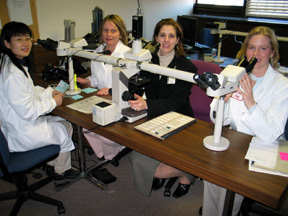 |
From left, Jianhong Sun, Michele Koch, Amber Donnelly and Geriann Davis-Therkildsen. |
Cytotechnologists are medical laboratory technologists who specialize in cytology, the study of cell structure, function and pathology. Much of their work involves preparing, processing and microscopically examining cell specimens to detect abnormalities that might indicate malignant disease, changes in hormonal status, inflammation or infection.
The field of cytotechnology is multidisciplinary and incorporates aspects of anatomy, histology, pathology and physiology, as well as molecular biology and computerization.
“You can tell a lot about a person by viewing their cells under a microscope,” said Michele Koch, a student at UNMC’s Cytotechnology Education Program. “I certainly have learned that smoking affects a lot more than just a person’s lungs; drinking affects more than just a person’s liver; and having more than one sexual partner increases a woman’s chance of having cervical cancer. All the warnings your grandma told you about clean living is true!”
A non-traditional student – as are many of today’s entrants into cytotechnology — Koch is from Hastings, Neb., and is married with several nearly grown children. She began her health career as a certified emergency medical technician, and then earned her associate degree and certification as a medical assistant and her certification as a medical transcriptionist. Eventually she earned a bachelor’s of science degree in healthcare management from Bellevue University.
“As a medical assistant, I was trained in basic lab techniques, which I performed in the physician’s office,” Koch said. “I really enjoyed looking in the microscope. I discovered I like the field of cytotechnology, but at that time, there wasn’t a program in Omaha, so I raised my children. Now that there’s a program at UNMC, just a few hours away from my home, I stay with a friend in Omaha during the week while attending classes and then go home on the weekends. It’s only a one-year program and I felt my kids could handle mom’s latest adventure.”
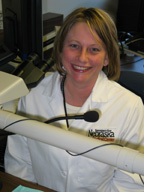 |
Michele Koch |
“A lot of people love health science, but may not want to deal with patients,” Donnelly said. “People may love lab work, but prefer consistent work hours – generally 8 a.m. to 5 p.m. and no weekends or holidays. You have the personal responsibility and pride of putting your own name on every final lab report you send back with your analysis of the cells you examined.”
By taking a one-year program and receiving certification (after earning your bachelor’s degree), a cytotechnologist’s salary can start at about $45,000, Donnelly said. Many practitioners who like moving around prefer working for agencies where they can travel and let the agency maintain all their records, she said.
While cytotechnologists analyze a number of fluid samples taken from the body – urine, spinal, peritoneal (abdominal) and pleural (lung) – perhaps the field is best known for what may be 80 percent to 100 percent of their daily duties – identifying pre-cancerous changes in the female cervix from Pap smears. In fact, it is rare that an entire medical subspecialty owes so much to a single person. George N. Papanicolaou, M.D., or “Dr. Pap,” is often called “the father of modern cytology” for inventing one of the world’s most effective cancer prevention methods.
Dr. Pap began to publish material in the 1920s on the use of cell analysis to evaluate female production estrogen and progesterone. In 1928, he discovered that this method might be able to diagnose cancer of the uterine cervix. He subsequently helped organize an extensive study of the development of the vaginal smear for early diagnosis of reproductive tract cancer in women. He published his first results of the Pap smear’s value in 1941 and by 1945 the American Cancer Society devoted 25 percent of its funds to promoting the procedure.
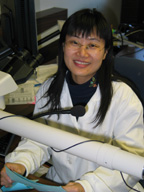 |
Jianhong Sun |
Today, there are only about 40 programs in the United States that teach cytotechnology. The majority of the programs only take four to eight students per cycle. UNMC’s program is the first accredited cytotechnology program in the nation to offer distance education. The distance program is affiliated with the University of Illinois at Urbana. Up to four students will do all lectures and didactic assignments through the Internet and lab work at the Carle Clinic in Urbana, Ill.
The field continues to be a beacon of light for diversity, in Nebraska and nationally, particularly for students from other countries. Jianhong Sun was a medical doctor who specialized in internal medicine-nephrology in her native China. She said that pursuing certification as a cytotechnologist helps her to do challenging and rewarding work. She has always had a personal interest in the examination and study of cells (“I love studying cells, cells, cells”).
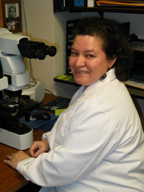 |
Mariela Castillo |
“I never lost hope and last year completed my certification,” said Castillo, now employed by The Nebraska Medical Center. “I really wanted to stay in cytotechnology because it is so challenging and rewarding every day to recognize abnormal cells and help the clinician detect cancer in a patient. I know from personal experience how painful it is when a family member dies from cancer. I feel like I’m helping to save lives every day.”
Geriann Davis-Therkildsen is from Omaha and graduated from Central High School, barely a mile from UNMC’s campus. She was a photographer for the school newspaper and yearbook. She also received a bachelor’s of science degree in health care management from Bellevue University.
“My most favored subjects were photography and biology, so cytotechnology was a perfect fit for my passions,” Davis-Therkildsen said. “In fact, I took the Meyer and Briggs Personality Type Preference Indicator Test and cytotechnology was one of the fields suggested as a match for my profile.
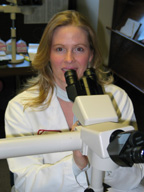 |
Geriann Davis-Therkildsen |
UNMC’s School of Allied Health Professions Cytotechnology Education Program is a one-year program open to all who possess an undergraduate degree and can meet any additional prerequisite coursework (if necessary). The current annual tuition is $6,080, along with several hundred dollars in additional fees. There are extenuating circumstances that may allow for out-of-state applicants to receive in-state tuition rates.
For more information, contact Amber Donnelly at 402-552-2043 or visit UNMC’s cytotechnology Web site at www.unmc.edu/alliedhealth/cytotech.htm. On-line applications for the next class remain open until May 31.